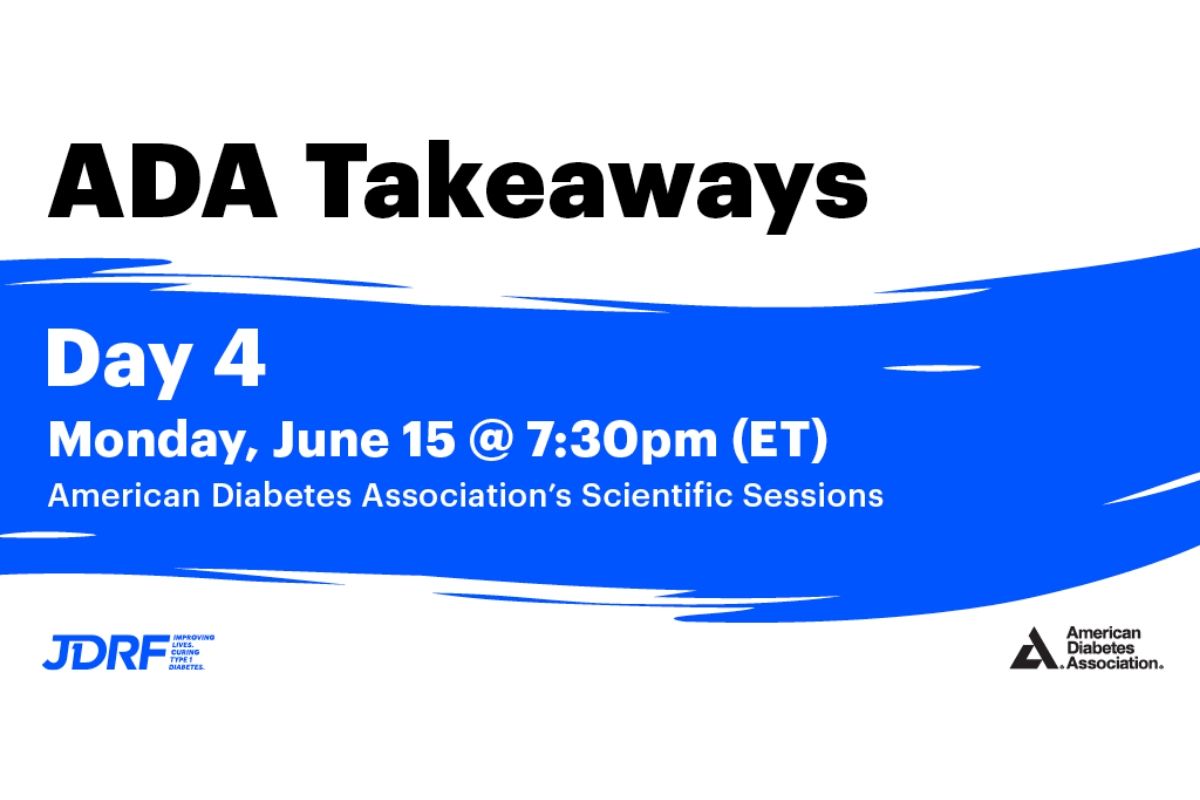
The American Diabetes Association’s Scientific Sessions is here! Until June 16, scientists will present some of the most updated topics, from beta cell replacement to regeneration and glucose and complications trials, all with the result to change things for the type 1 diabetes (T1D) community. Here are Drs. Emily Sims, Jay Skyler, Marian Rewers and Matthias Kretzler to share their key takeaways from day 4, with their commentary in the video and below:
Emily Sims, M.D.
Physician-Scientist, Indiana University
Teplizumab Reverses the Loss of C-peptide in Relatives at Risk for T1D
Dr. Emily Sims provided really exciting results in her update on the teplizumab clinical trial. As a reminder, the landmark study of teplizumab showed it could delay the onset of T1D for about 2 years in participants with a high risk of developing the disease (and was presented at ADA 2019). But, Dr. Sims explained, we don’t know how this treatment affected the function of beta cells. They used C-peptide, a marker of insulin secretion, and found that the loss of C-peptide was reversed in teplizumab people with T1D within 6 months, and it improved beta cell function in those individuals. Follow up on the individuals who didn’t develop clinical diabetes, the effect of teplizumab had been sustained: 50% of those treated with teplizumab remain diabetes-free, compared to only 22% of those taking placebo. The delay in diabetes onset was close to 3 years (35 months).
Jay S. Skyler, M.D.
University of Miami
Leveraging Metabolism to Prevent, Treat, or Cure T1D
Dr. Jay Skyler talked about artificial pancreas systems versus immune therapy. He started with artificial pancreas technology clinical trials in Europe (presented by Charlotte K. Boughton, Ph.D.) and the U.S. (presented by R. Paul Wadwa, M.D.), which are taking place along the whole spectrum of T1D, from age (children age 1-7, young children age 6-12, youth age 6-18, in adults, older adults, greater than 60), to pregnancy to those people with sub-optimal control of T1D to people who have hypoglycemia unawareness to hospitals. Prevention was presented by Olga Kordonouri, Ph.D., who discussed the GPPAD (Global Platform for the Prevention of Autoimmune Diabetes) program, which screens kids at birth for genetic markers of T1D, and enrolling ones who have high genetic risk in the oral insulin trial. Dr. Skyler added commentary: Asked if he had a preference for either artificial pancreas systems or immune therapy: “They’re all needed!” We need artificial pancreas technology now, to get people in excellent control, we need immunomodulation to preserve beta cell function and to prevent T1D, but we need to replace beta cells. This can be done today with pancreas/islet transplants, but, in the future, we’re going to have unlimited supply of beta cells using stem cells. “We’re standing at the threshold…and I am really optimistic for the future.”
Marian Rewers, M.D., Ph.D.
Professor of Pediatrics and Medicine and Executive Director, Barbara Davis Center for Diabetes, University of Colorado, Denver, CO
Update from the TEDDY Study
Dr. Marian Rewers gave an update on the TEDDY study (which stands for The Environmental Determinants of Diabetes in Youth). He took a 30,000 feet view: What has TEDDY found so far? Background: We screened almost half a million children in four countries: U.S., Finland, Sweden and Germany, and we followed those kids that had the highest genetic risk of developing T1D, almost 9,000 children. TEDDY found that autoimmunity starts very early, between the first and second year of life, and the best predictor: islet autoimmunity + genetic markers. They also found that the persistent presence of enterovirus B strongly predicts development of islet autoimmunity. (Another presenter, William Hagopian, M.D., Ph.D., provided evidence that enteroviral infections can be important for developing celiac disease, a related autoimmune disease.) He advocated for a clinical trial to test if probiotics, given to infants, can prevent the development of islet autoimmunity. But there’s good news: There is no association between antibiotics in early childhood and development with either celiac disease or T1D. Higher levels of vitamin D may be associated with lower risk of islet autoimmunity (but only in children with certain genotypes in the vitamin D receptor gene), vitamin C may have a protective effect and lower levels of omega-3 fatty acid predicts the development of islet autoimmunity.
Matthias Kretzler, M.D.
University of Michigan
Novel Approaches for Cell and Tissue Therapy—Using the Kidney as a Model
Dr. Matthias Kretzler gave an update for the diabetes community with very exciting results we are seeing in diabetic kidney disease. The SGLT2 inhibitors, in clinical trials, helped to reduce the progression of kidney disease. There is very exciting, cutting-edge technologies to cell types and how they respond to disease in the kidney. There is single cell analysis, 3D multifluoresence imaging, spatial transcriptomics and more, which Dr. Kretzler will outline in his takeaway from day 4.